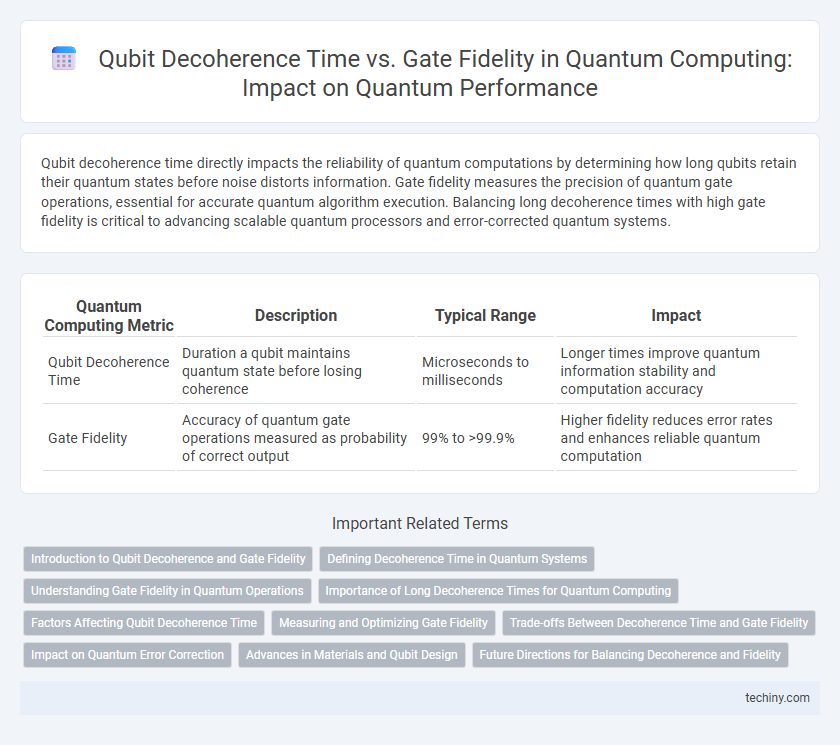Qubit decoherence time directly impacts the reliability of quantum computations by determining how long qubits retain their quantum states before noise distorts information. Gate fidelity measures the precision of quantum gate operations, essential for accurate quantum algorithm execution. Balancing long decoherence times with high gate fidelity is critical to advancing scalable quantum processors and error-corrected quantum systems.
Table of Comparison
| Quantum Computing Metric | Description | Typical Range | Impact |
|---|---|---|---|
| Qubit Decoherence Time | Duration a qubit maintains quantum state before losing coherence | Microseconds to milliseconds | Longer times improve quantum information stability and computation accuracy |
| Gate Fidelity | Accuracy of quantum gate operations measured as probability of correct output | 99% to >99.9% | Higher fidelity reduces error rates and enhances reliable quantum computation |
Introduction to Qubit Decoherence and Gate Fidelity
Qubit decoherence time measures how long a qubit maintains its quantum state before environmental noise causes errors, directly impacting quantum information stability. Gate fidelity quantifies the accuracy of quantum gate operations, reflecting how closely implemented gates match ideal unitary transformations. Understanding the trade-off between decoherence time and gate fidelity is critical for optimizing quantum circuit performance and error correction strategies.
Defining Decoherence Time in Quantum Systems
Decoherence time in quantum systems refers to the duration over which a qubit maintains its quantum state before environmental interactions cause loss of coherence, directly impacting the reliability of quantum computations. Longer decoherence times allow for more gate operations to be performed within coherence limits, enhancing overall algorithmic accuracy. Gate fidelity measures the precision of quantum gate operations, and optimizing both decoherence time and gate fidelity is essential for scalable, error-resistant quantum computing architectures.
Understanding Gate Fidelity in Quantum Operations
Gate fidelity quantifies the accuracy of quantum gate operations by measuring how closely the executed gate matches the ideal target operation, directly impacting the reliability of quantum algorithms. Qubit decoherence time limits coherent quantum state manipulations, but high gate fidelity ensures that each quantum gate performs optimally during the decoherence window. Maximizing gate fidelity within available decoherence times is critical for scalable quantum error correction and achieving fault-tolerant quantum computing.
Importance of Long Decoherence Times for Quantum Computing
Long decoherence times in qubits are crucial for maintaining quantum coherence, enabling reliable quantum information processing and error correction in quantum computing. High gate fidelity depends on qubits retaining their quantum states long enough to perform multiple gate operations accurately. Prolonged coherence times directly impact the scalability and practical implementation of quantum algorithms by minimizing noise and operational errors.
Factors Affecting Qubit Decoherence Time
Qubit decoherence time is primarily influenced by environmental noise, material defects, and temperature fluctuations, which disrupt quantum states and reduce coherence. Gate fidelity, while critical for accurate quantum operations, depends on precise control pulses and error mitigation techniques that minimize gate errors but do not directly extend decoherence time. Enhancing qubit coherence demands improvements in isolation methods and qubit design to mitigate decoherence sources, thereby enabling longer operational windows for high-fidelity gate operations.
Measuring and Optimizing Gate Fidelity
Gate fidelity in quantum computing measures the accuracy of quantum gate operations, critically influenced by qubit decoherence time, which limits the duration over which qubits maintain coherence. Precise measurement techniques such as randomized benchmarking and quantum process tomography quantify gate fidelity by isolating errors from decoherence effects. Optimizing gate fidelity involves engineering qubit environments to extend decoherence times and implementing error-correction protocols to mitigate operational imperfections, thereby enhancing overall quantum processor performance.
Trade-offs Between Decoherence Time and Gate Fidelity
Trade-offs between qubit decoherence time and gate fidelity critically impact quantum computing performance, as longer decoherence times preserve qubit states but often require slower gate operations, potentially reducing fidelity. High-fidelity gates demand faster control pulses, which can introduce noise and errors, shortening effective decoherence time. Optimizing quantum circuits requires balancing these factors to minimize error rates and maximize coherent quantum information processing.
Impact on Quantum Error Correction
Qubit decoherence time directly influences the effectiveness of quantum error correction by limiting the time available for reliable gate operations before quantum information degrades. High gate fidelity reduces operational errors during quantum computations, enhancing error correction schemes' success in maintaining qubit coherence. Balancing extended decoherence times with improved gate fidelities is critical for achieving scalable, fault-tolerant quantum computing systems.
Advances in Materials and Qubit Design
Recent advances in materials science and qubit design have significantly extended qubit decoherence times while enhancing gate fidelity, essential for reliable quantum computation. Innovations in superconducting qubits utilize high-purity aluminum and optimized junction fabrication, reducing noise and energy loss to improve coherence. Improved qubit architectures, such as 3D transmons and topological qubits, demonstrate enhanced resistance to decoherence, directly boosting the precision of quantum gate operations.
Future Directions for Balancing Decoherence and Fidelity
Future research in quantum computing emphasizes extending qubit decoherence times while simultaneously improving gate fidelity through advanced error correction codes and optimized qubit architectures. Developing hybrid quantum-classical algorithms and materials with reduced noise susceptibility enhances coherence without sacrificing operational accuracy. Innovations in dynamic decoupling and real-time feedback control promise to balance these critical parameters, enabling scalable and reliable quantum processors.
Qubit decoherence time vs Gate fidelity Infographic

 techiny.com
techiny.com